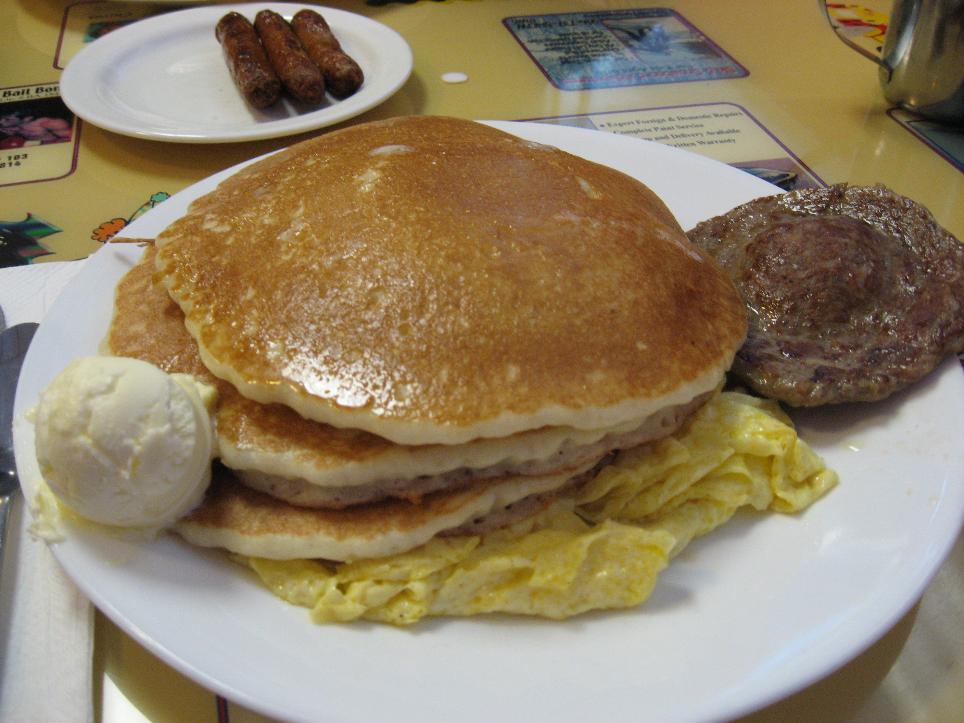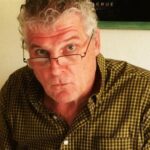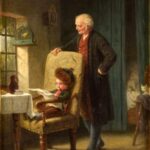“Breakfast this time of day?” my father asked, when I suggested pancakes. It was 8:30 in the morning. We were leaving the lab where he had just had blood drawn, doctor’s orders. He was eighty-eight years old, and the only medication he took was for his mind. I knew he was hungry because my mother had made sure he fasted for eight hours beforehand, which had been difficult for her because my father spent most nights awake, snacking on nuts and saltine crackers, leaving a trail of his nocturnal activities. It was the third of February, four days before the stroke that killed him, ten days before he died.
When I was a kid, my father made pancakes for our family every Sunday morning, and even when I had grown up and moved away, he would still make them at least once every visit. When he reached the point where he could no longer remember how to mix the batter, he stopped cooking, but he never lost his love for a good pancake.
We found ourselves seated at Pancake Circus, my father’s favorite restaurant, and he ordered, as always, breakfast #1, two eggs and three pancakes, the eggs over easy. Our booth was by a window because he liked to look out at the people and the cars and the animals. He would ask about the different kind of birds flying around, perching on trees and bushes. It was a sunny day, and in northern California winter begins to end by February, with trees already beginning to bud. He was amazed at the sight of spring. He would ask me the same sort of questions I must have asked him fifty years earlier.
He lathered each pancake with butter, soaked them with syrup, and then laid the two eggs on top. He smiled at me as he did this, smiled like a child who loved what he was doing but was unsure if he should be having this much fun. Sometimes my father would become irritable and frustrated with what was happening to him, and difficult to handle, but more often he was calm and happy. He was usually the most pleasurable 180-pound child you could ever hope to be around. I loved to see my father happy like this. “They just melt in your mouth,” he said with his mouth full, savoring the taste of the pancakes like others would some fine wine.
He cut his pancakes carefully, making sure he had a little egg with every bite he took. But with every bite he would smear syrup around his mouth. Once, when he was watching some birds hop from limb to limb in a small bush, I wiped the excess syrup from around his lips. He turned to me and smiled.
The mornings could be like that, with him childlike and peaceful, as cute as a puppy or small child you wanted to hold in your arms and never let go of. You didn’t want him to go away. But always he had to leave. As the morning turned to afternoon, he became tired and more irritable. He never slept throughout the night, even though he would go to bed when my mother did. He would rise and seat himself on the floor of his walk-in closet, packing and unpacking his favorite suitcase, preparing for his final trip.
When my parents were still living in Arizona, where they had retired, and we would speak on the phone, my father would ask me where I lived. When I told him California, he would ask how far that was. He was always studying maps, and when my mother would point out to him where they were living, he would mark the roads he needed to follow to reach me.
I remember my father having the best sense of direction, and the loss of that was one of the earlier signs of Alzheimer’s. He would get lost taking a walk in the neighborhood, and someone would either bring him home or my mother would look for him. Eventually, she couldn’t let him out of the house on his own. This is when he would become frustrated.
My mother fell in the bathroom once, and my father found his way to the fire station two blocks from their home and reported what had happened. But, trying to follow the ambulance home he became lost and drove around until finding a hotel. The clerk at the front desk called the police when an old and disoriented man tried to rent a room. My phone number was in his wallet and the police called me to speak with him and calm him down before taking him home to be with my mother who was waiting for him, fortunately uninjured.
At first my mother was comfortable with my father being up at night, looking at his maps and packing his bags, but she became frightened when he began looking for and sometimes finding the keys to the car, trying to quietly lock his suitcase in the trunk, saying they needed to go to California, to where I lived. It wasn’t me that he missed so much, though. Often on my visits to Arizona my father could not recognize me. He once said, “I’ve seen you around, but I don’t know who you are or what you want.” What he knew was that he needed to get my mother closer to me.
My mother would regularly wake in time to find him ready to leave, but talk him out of it. The last time this happened, though, she rose to discover the garage door open and the car gone. The police found him in his underwear at a gas station about a mile from home, asking for directions to California.
It was obvious then, to my mother and me, that she and my father had to move back to California, to be closer to me. My father was getting what he wanted.
He didn’t finish his pancakes that morning. In all my life I had never seen my father leave any part of breakfast on his plate. I know now that was a message for us, that his body was preparing to go away, to go where his mind had already gone. But he was full and satisfied and said that when we came back next time we should get a booth by the window, so he could look at the people and the cars and the animals.
He had worked as a mechanic for over forty years, and before his brain began to misfire, he liked to talk about engines and suspensions and electrical systems, even if his audience had no interest in what he was saying. Both my wife and mother regularly comment on how similar I am to my father–not just physically, but also in how I relate to the world–but one difference we had was that I don’t have a lot of mechanical aptitude, and never put much effort into developing what ability I had. I come from a family with a long history of doing what I call real work, or of making sure some form of machinery could do that work, but I never fit in in that way.
Once, when I was a teenager, I overheard an uncle ask my father if I was interested in cars and Dad said, “He’s interested in where the ignition switch is.” I think that must have been some kind of inside mechanics joke.
When I was twelve, my father got me a model of a V-8 engine for Christmas, a model with something like a thousand parts. The gift had underwhelmed me, it was obvious to see. “Maybe we should have gotten him something else,” I heard my mother say to him from another room, later that day.
“He’s twelve years old,” my father said. “It’s time he learns how an engine works.” I know now this is part of what my father took as his responsibility to make a man of me, to pass along to his son what he knew of the world. This was a job that turned out to be much more difficult for him than he ever could have envisioned.
Fortunately, and in no small part from his help, I grew to become someone I was happy to be, and who my father was also proud of and happy to know. When his condition became too much for my mother to handle by herself, I was glad to be able to move them close to me. My mother no longer drove, and I took them grocery shopping, and to medical appointments, and sometimes to breakfast. I would provide breaks for Mom as often as I could, because caring for someone with Alzheimer’s is terribly wearing work.
We were playing cards at eleven o’clock on a Saturday morning, a game called Casino. It amazes me that even with the deterioration of his mind he could still remember how to play, which we had done together since I was a child. He knew the value of cards and could strategize and keep score. When I noticed he was having trouble holding his cards and had begun to slur his words I had him squeeze my hands, and then drove him to the hospital.
What the doctors originally thought was a small stroke turned into something more like watching a train wreck in slow motion. He was actually experiencing two separate strokes at the same time. One was an ischemic stroke, brought on by a blood clot, and the other was a hemorrhagic, the result of a ruptured blood vessel. The doctors couldn’t treat one stroke without exacerbating the effects of the other, and so we sat for two straight days as his conditioned worsened hour by hour. When it was over, the damage took my breath away.
He had no control over his body and could not move. His once strong right arm was dead weight. My father cried the day his stroke began, as he lay in the emergency ward, watching himself lose his speech and his strength. He cried the day after the stroke receded when my mother and I came to see him, as he looked at us looking at the wreckage. He couldn’t move but his tear glands still worked. I wiped his tears because he could not.
He couldn’t eat or drink or speak. Three days of investigative therapy revealed he never would. This is when his doctor took me to a small, secluded room and handed me a box of tissues. My father had made me promise to never let him live the life of an invalid, without autonomy, without the dignity of hope. It is an easier promise to make than to hold oneself to, and after speaking with the doctor I picked up my wife to drive to my mother’s house to tell her Dad would not be coming home.
I would visit my father three times a day, but he was heavily sedated as we waited for him to die. Sedated to near unconsciousness. But on the last day of my father’s life his eyes opened during my noon visit. He normally had greyish-blue eyes, but on this day they were a brilliant baby blue, the most youthful eyes I have ever seen.
He looked so peaceful and calm. And trusting. I’m not sure about the trusting, but I hope so. We looked at each other as I held his hand until he closed his eyes again. I will never forget this moment.
My mother had stepped out of the room, and did not see this. My father’s dying was very hard on her. I went to her and said she should say bye to Dad. “I already kissed your father,” she told me.
“No,” I said. “You need to say goodbye.”
That evening I noticed the nurses had cleaned him and tucked him neatly in bed. The medication with which he was sedated was morphine, and the level he was receiving had been increased.
When my father’s chest ceased moving, he quickly began to cool. I held him and kissed and smelled as much of him as I could. I did not know I could cry the way I did. A nurse shut the door so we could be alone.
I signed some papers and then drove to my mother’s home, where my parents had lived for less than three months, not a mile from where I lived with my wife. She answered the door on a Friday night to see her son, his eyelids red and swollen, his mouth as unable to move as had been his father’s. I could not speak.
“He’s gone, isn’t he Glen?” she asked, and then we held each other and cried. “He’s at peace,” she kept telling me. “He’s at peace now.” I hope that is true.
The most responsible man I have ever known would not let himself rest until he had met his final obligation, and he certainly deserves his rest.








4 comments
gordon marino
What a tender and powerful piece. When the ties that bind break, oh the pain. Such a reminder of the fragility of life and a caution not to be careless and to take care of what matters most- our relationships. Thanks Mr. Sharp.
Dan Grubbs
Powerful. I am thankful that Mr. Sharp has shared in this way. A wonderful indication that caregivers are not alone in their struggles.
Brian Covi
That’s a very touching story Glen. Thanks. By the way, I think I got the same V-8 model engine when I was about same age. I remember it was called The Visible V-8.
Brian
This is an extraordinary piece of writing. Thank you so much for sharing it. I am very sorry for your loss.
Comments are closed.